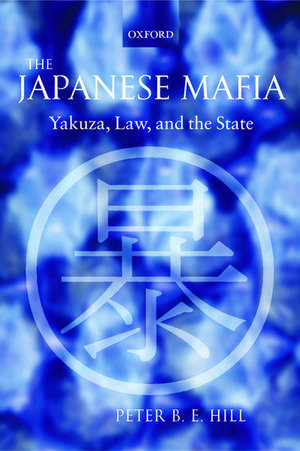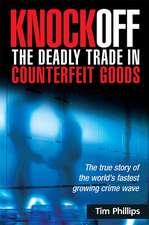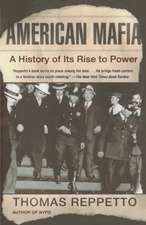The Japanese Mafia: Yakuza, Law, and the State
Autor Peter B. E. Hillen Limba Engleză Paperback – 26 ian 2006
| Toate formatele și edițiile | Preț | Express |
|---|---|---|
| Paperback (1) | 322.27 lei 31-37 zile | |
| OUP OXFORD – 26 ian 2006 | 322.27 lei 31-37 zile | |
| Hardback (1) | 702.37 lei 31-37 zile | |
| OUP OXFORD – 4 sep 2003 | 702.37 lei 31-37 zile |
Preț: 322.27 lei
Preț vechi: 372.08 lei
-13% Nou
Puncte Express: 483
Preț estimativ în valută:
61.67€ • 63.63$ • 52.20£
61.67€ • 63.63$ • 52.20£
Carte tipărită la comandă
Livrare economică 21-27 februarie
Preluare comenzi: 021 569.72.76
Specificații
ISBN-13: 9780199291618
ISBN-10: 0199291616
Pagini: 336
Ilustrații: Numerous figures and tables
Dimensiuni: 156 x 234 x 20 mm
Greutate: 0.49 kg
Editura: OUP OXFORD
Colecția OUP Oxford
Locul publicării:Oxford, United Kingdom
ISBN-10: 0199291616
Pagini: 336
Ilustrații: Numerous figures and tables
Dimensiuni: 156 x 234 x 20 mm
Greutate: 0.49 kg
Editura: OUP OXFORD
Colecția OUP Oxford
Locul publicării:Oxford, United Kingdom
Recenzii
Review from previous edition Peter Hill, a British researcher with first-hand knowledge of Japanese society, offers a remarkable insight into the structures and workings of this mysterious organisation ... The book is as fascinating as it is informative.
In this superb book Peter Hill challenges prevailing interpretations of the yakuza and in doing so explores the pathology and dynamism of contemporary Japan ... Hill writes with authority and panache, demonstrating a command of the literature while alerting readers to the pitfalls of various data. In looking under this rock, he tells a compelling story about Japan's underworld, showing us how it is far more significant, and rapidly changing, than is commonly assumed. A wry wit and judicious doses of colorful anecdotes leavens this complex and revisionist interpretation of the relationship between the yakuza, law and the state.
The Japanese Mafia is an exceptional piece of scholarship in an area that has needed such a work for a long time. The book will appeal to academics from across the disciplines and to policymakers and practitioners interested in the challenges posed by organized crime.
I cannot recommend this book highly enough to any one with an interest in the interplay of culture, crime, and law.
In this superb book Peter Hill challenges prevailing interpretations of the yakuza and in doing so explores the pathology and dynamism of contemporary Japan ... Hill writes with authority and panache, demonstrating a command of the literature while alerting readers to the pitfalls of various data. In looking under this rock, he tells a compelling story about Japan's underworld, showing us how it is far more significant, and rapidly changing, than is commonly assumed. A wry wit and judicious doses of colorful anecdotes leavens this complex and revisionist interpretation of the relationship between the yakuza, law and the state.
The Japanese Mafia is an exceptional piece of scholarship in an area that has needed such a work for a long time. The book will appeal to academics from across the disciplines and to policymakers and practitioners interested in the challenges posed by organized crime.
I cannot recommend this book highly enough to any one with an interest in the interplay of culture, crime, and law.








